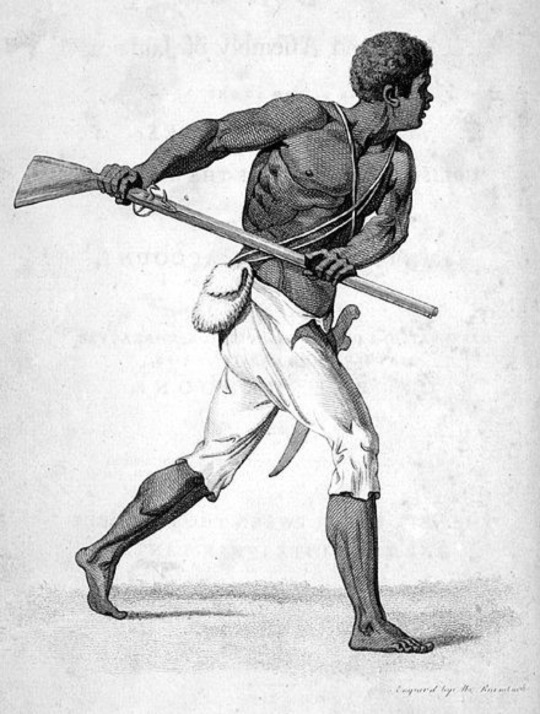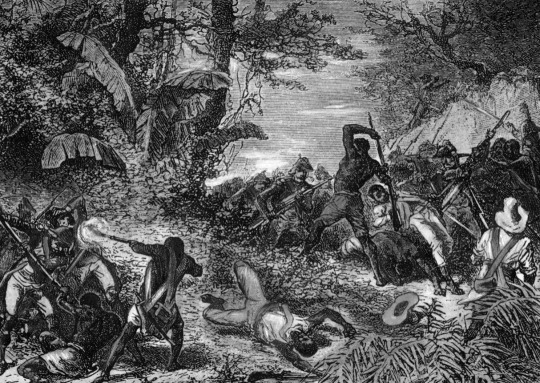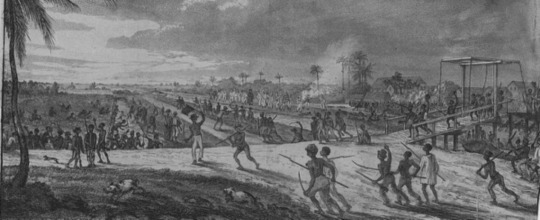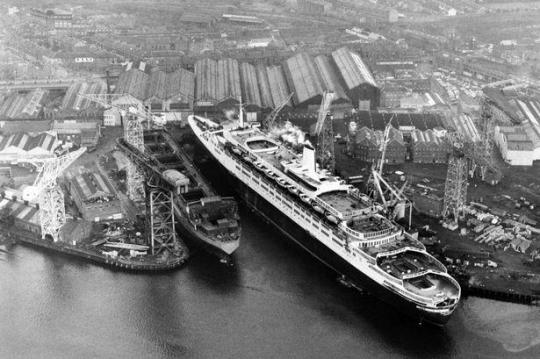#Government of Barbados
Explore tagged Tumblr posts
Text
Congratulations to Hyrule for being one of five countries with women as both head of state and head of government


#the others are barbados bosnia+herzegovina denmark and honduras#apologies if i've missed any#there are also some governments in exile that might qualify#purah#totk#tears of the kingdom
92 notes
·
View notes
Text
Mia Mottley | TIME100
youtube
5 notes
·
View notes
Text
Barbados. The government houses at Lancaster look great - just the right size.
https://youtu.be/WqHoBI1nMXQ
You too should do a walkthrough and let people here know what you think about the layout. Naked!!
Like. Share. Subscribe.
youtube
0 notes
Text




List of notable slave revolts in the Caribbean during the Transatlantic/European Slave Trade. These Slave revolts emphasise the collective struggle for liberation,
unity, and self-determination:
1. The 1638 St. Kitts Slave Revolt: Enslaved Africans resisted early attempts by European colonizers to dominate the island. This uprising showed that from the very beginning, Africans refused to accept their dehumanization and fought to retain their dignity.
2. Barbados Revolt of 1649: Africans in Barbados challenged the plantation system, laying the foundation for future resistance. This revolt demonstrated the shared struggle of African people across different colonies.
3. The 1675 Curaçao Revolt: Enslaved Africans, many of whom were from the Akan and other warrior societies in West Africa, plotted to overthrow the Dutch colonists. This revolt highlighted the persistence of African resistance traditions, even in exile.
4. Tacky’s War (1760, Jamaica) :Led by Akan warriors like Tacky, this revolt was deeply rooted in African military traditions. It was a call for liberation and unity, showcasing the resilience of African cultures under enslavement.
5. Berbice Slave Rebellion (1763, Guyana): Under Cuffy (Kofi), enslaved Africans controlled parts of Berbice for over a year. This Pan-African hero envisioned an independent African-led society in the Americas, directly challenging European colonialism.
6. Coromantee Wars (1765–1766, Jamaica): Enslaved Akan Africans led revolts against British plantation owners. The unity of African warriors in organizing these rebellions demonstrated the spirit of Pan-Africanism.
7. 1773 Grenada Revolt: Africans resisted their French and British oppressors, reflecting a Pan-African vision of collective liberation and defiance against European exploitation.
8. The First Maroon War (1728–1740, Jamaica): Maroons, descendants of escaped Africans, fought the British for autonomy. Their victory in establishing independent territories was a significant Pan-African triumph.
9. Haitian Revolution (1791–1804, Saint-Domingue): The most powerful expression of Pan-Africanism in the Caribbean, this revolution united enslaved Africans and free people of color. Leaders like Toussaint Louverture, Jean-Jacques Dessalines, and others overthrew French rule, ending slavery and creating the first Black republic.
10. Bussa’s Rebellion (1816, Barbados): Bussa, inspired by the African tradition of communal resistance, led this uprising against British slavery. It echoed Garveyite ideals of self-determination before their time.
11. Demerara Rebellion (1823, Guyana): Led by Jack Gladstone and Quamina, this revolt sought freedom for Africans in British Guiana. It reflected a broader Pan-African consciousness and the demand for dignity and justice.
12. Baptist War (1831–1832, Jamaica): Also known as the Christmas Rebellion, it was led by Samuel Sharpe, who united enslaved people under the banner of Christian and African liberation. This revolt hastened the abolition of slavery in the British Empire.
13. The Second Maroon War (1795–1796, Jamaica): Maroons resisted British incursions into their autonomy, preserving their African-rooted systems of governance and solidarity.
14. 1837 St. Lucia Revolt: Enslaved Africans rose up against British oppression. Their resistance embodied Pan-African ideals, rejecting the colonial domination of their homeland.
15. Trinidad Slave Revolt (1838): Enslaved Africans on the brink of emancipation staged a revolt, demonstrating their refusal to accept anything less than complete freedom.
16. 1733 St. John Slave Revolt (Virgin Islands): Enslaved Africans, many of whom were Akan, took control of the Danish colony for several months. Their strategic unity reflected a Pan-African ethos.
17. Leeward Maroon Wars (1730s–1740s, Antigua and Jamaica): These wars involved guerrilla tactics by escaped Africans who maintained cultural and spiritual links to their homelands.
18. Martinique Revolt (1833): Enslaved Africans rose up against French rule, signalling the unity of Black people against colonial oppressors across linguistic and cultural divides.
19. Santo Domingo Resistance (1795, Dominican Republic): Inspired by the Haitian Revolution, enslaved Africans rebelled, resisting both Spanish and French colonial systems.
#black people#black#black history#black tumblr#blacktumblr#pan africanism#black conscious#africa#black power#black empowering#slave revolts#Slave Rebellion#trans atlantic slave trade#african history#black culture#african culture#black community#caribbean history#afro caribbean culture#black liberation#black freedom#uprising#black revolution
254 notes
·
View notes
Text
Made to labor for nearly double the hours of British yeoman farmers, African slaves would have an average working life of just seven years on the plantations of Brazil and the Caribbean. In the 1630s, a Jesuit plantation manager in Bahia, Brazil, wrote that the high mortality among slaves required an annual 6 percent replacement rate. A Barbados planter reported the same rate of slave losses, saying that “he that hath but a hundred Negroes should buy half a dozen every year to keep up his flock.” As long as the transatlantic human traffic could feed this voracious appetite for fresh slaves, plantations proved sustainable and highly profitable. Indeed, an econometric analysis of US agriculture in the early nineteenth century found the Southern slave plantation was 35 percent more efficient than a northern family farm. By literally working massed teams of slaves to death, the tropical sugar plantation maximized the energy output of the human body, creating a cruel economic logic that would drive the relentless expansion of the slave trade for the next four hundred years.
Alfred W. McCoy, To Govern the Globe: World Orders and Catastrophic Change
94 notes
·
View notes
Text
when the Empire's researchers realized that the cause of the ecological devastation was the Empire:

much to consider.
on the motives and origins of some forms of imperial "environmentalism".
---
Since the material resources of colonies were vital to the metropolitan centers of empire, some of the earliest conservation practices were established outside of Europe [but established for the purpose of protecting the natural resources desired by metropolitan Europe]. [...] [T]ropical island colonies were crucial laboratories of empire, as garden incubators for the transplantation of peoples [slaves, laborers] and plants [cash crops] and for generating the European revival of Edenic discourse. Eighteenth-century environmentalism derived from colonial island contexts in which limited space and an ideological model of utopia contributed to new models of conservation [...]. [T]ropical island colonies were at the vanguard of establishing forest reserves and environmental legislation [...]. These forest reserves, like those established in New England and South Africa, did not necessarily represent "an atavistic interest in preserving the 'natural' [...]" but rather a "more manipulative and power-conscious interest in constructing a new landscape by planting trees [in monoculture or otherwise modified plantations] [...]."
Text by: Elizabeth DeLoughrey and George B. Handley. "Introduction: Toward an Aesthetics of the Earth". Postcolonial Ecologies: Literatures of the Environment, edited by DeLoughrey and Handley. 2011. [Text within brackets added by me for clarity and context.]
---
British colonial forestry was arguably one of the most extensive imperial frameworks of scientific natural resource management anywhere [...]. [T]he roots of conservation [...] lay in the role played by scientific communities in the colonial periphery [...]. In India, [...] in 1805 [...] the court of directors of the East India Company sent a dispatch enquiring [...] [about] the Royal Navy [and its potential use of wood from Malabar's forests] [...]. This enquiry led to the appointment of a forest committee which reported that extensive deforestation had taken place and recommended the protection of the Malabar forests on grounds that they were valuable property. [...] [T]o step up the extraction of teak to augment the strength of the Royal Navy [...] [b]etween 1806 and 1823, the forests of Malabar were protected by means of this monopoly [...]. The history of British colonial forestry, however, took a decisive turn in the post-1860 period [...]. Following the revolt of 1857, the government of India sought to pursue active interventionist policies [...]. Experts were deployed as 'scientific soldiers' and new agencies established. [...] The paradigm [...] was articulated explicitly in the first conference [Empire Forestry Conference] by R.S. Troup, a former Indian forest service officer and then the professor of forestry at Oxford. Troup began by sketching a linear model of the development of human relationship with forests, arguing that the human-forest interaction in civilized societies usually went through three distinct phases - destruction, conservation, and economic management. Conservation was a ‘wise and necessary measure’ but it was ‘only a stage towards the problem of how best to utilise the forest resources of the empire’. The ultimate ideal was economic management, [...] to exploit 'to the full [...]' and provide regular supplies [...] to industry.
Text by: Ravi Rajan. "Modernizing Nature: Tropical Forestry and the Contested Legacy of British Colonial Eco-Development, 1800-2000". Oxford Historical Monographs series, Oxford University Press. January 2006.
---
It is no accident that the earliest writers to comment specifically on rapid environmental change in the context of empires were scientists who were themselves often actors in the process of colonially stimulated environmental change. [...] [N]atural philosophers [...] in Bermuda, [...] in Barbados and [...] on St Helena [all British colonies] were all already well aware of characteristically high rates of soil erosion and deforestation in the colonial tropics [...]. On St Helena and Bermuda this early conservationism led, by 1715, to the gazetting of the first colonial forest reserves and forest protection laws. On French colonial Mauritius [...], Poivre and Philibert Commerson framed pioneering forest conservation [...] in the 1760s. In India William Roxburgh [and] Edward Balfour [...] ([...] Scottish medical scientists) wrote alarmist narratives relating [to] deforestation [...]. East India Company scientists [...] [including] Roxburgh [...] went on to further observe the incidence of global drought events [...]. The writings of Edward Balfour and Hugh Cleghorn in the late 1840s in particular illustrate the extent of the permeation of a global environmental consciousness [...]. [T]he 1860s [were] a period [...] which embodies a convergence of thinking about ecological change on a world scale [...]. It was in the particular circumstances of environmental change at the colonial periphery that what we would now term "environmentalism" first made itself felt [...]. Victorian texts such as [...] Ribbentrop's Forestry in the British Empire, Brown's Hydrology of South Africa, Cleghorn's Forests and Gardens of South India [...] were [...] vital to the onset of environmentalism [...]. This fear grew steadily in the wake of colonial expansion [...] particularly [...] after the great Indian famines of 1876 [...].
Text by: Richard Grove and Vinita Damodaran. "Imperialism, Intellectual Networks, and Environmental Change: Origins and Evolution of Global Environmental History, 1676-2000: Part I". Economic and Political Weekly Vol. 41, No. 41. 14 October 2006
---
The “planetary consciousness” produced by this systemizing of nature [in eighteenth-century European science] […] increased the mobility of paradise discourse [...]. As European colonial expansion accelerated, the homogenizing transformation of people, economy and nature which it catalyzed also gave rise to a myth of lost paradise, which served as a register […] for obliterated cultures, peoples, and environments [devastated by that same European colonization], and as a measure of the rapid ecological changes, frequently deforestation and desiccation, generated by colonizing capital. On one hand, this myth served to suppress dissent by submerging it in melancholy, but on the other, it promoted the emergence of an imperialist environmental critique which would motivate the later establishment of colonial botanical gardens, potential Edens in which nature could be re-made. However, the subversive potential of the “green” critique voiced through the myth of endangered paradise was defused by the extent to which growing environmental sensibilities enabled imperialism to function more efficiently by appropriating botanical knowledge and indigenous conservation methods, thus continuing to serve the purposes of European capital.
Text by: Sharae Deckard. Paradise Discourse, Imperialism, and Globalization: Exploiting Eden. 2010.
#abolition#ecology#indigenous#multispecies#imperial#colonial#temporal#temporality#debt and debt colonies#tidalectics#archipelagic thinking#caribbean#interspecies#victorian and edwardian popular culture#carceral geography#ecologies#empire forestry#black methodologies#indigenous pedagogies#agents of empire#my writing i guess
161 notes
·
View notes
Text


[ 📹 Palestinians say their farewells at a funeral for civilian families murdered in cold blood by the Zionist occupation army in the Al-Bureij Refugee Camp, in the central Gaza Strip on Friday. 📸 Photos taken following Israeli occupation bombing on Friday across various sectors of the Gaza Strip. ]
🇮🇱⚔️🇵🇸 🚀🏘️💥🚑 🚨
CARIBBEAN COUNTRIES RECOGNIZE PALESTINIAN STATE, OCCUPATION FINDS NEW WAYS TO PUNISH PALESTINIANS ON DAY 210 OF GENOCIDE
On the 210th day of "Israel's" ongoing special genocide operation in the Gaza Strip, the Israeli occupation forces (IOF) committed a total of 3 new massacres of Palestinian families, resulting in the deaths of no less than 26 Palestinians, mostly women and children, while another 51 others were wounded over the previous 24-hours.
It should be noted that as a result of the constant Israeli bombardment of Gaza's healthcare system, infrastructure, residential and commercial buildings, local paramedic and civil defense crews are unable to reach countless hundreds, even thousands of victims who remain trapped under the rubble, or who's bodies remain strewn across the streets of Gaza.
This leaves the official death toll vastly undercounted as Gaza's healthcare officials are unable to accurately tally those killed and maimed in this genocide, which must be kept in mind when considering the scale of the mass murder.
In the latest news, a statement issued on Friday by the Palestinian Prisoners' Affairs Commission, along with the Palestinian Prisoners Society, announced the deaths of two Palestinian prisoners from the Gaza Strip in Israeli prisons.
One of the two prisoners included Dr. Adnan Ahmad al-Bursh (50yo), who was the Chief of the orthopedic department at Al-Shifa medical complex in the Al-Rimal neighborhood of Gaza City, while the second prisoner who died was Ismail Abdul Bari Khader (33yo).
Dr. Al-Bursh was kidnapped and detained by the Israeli occupation army back last December while visiting with a group of doctors at the Al-Awda Hospital, located in the Jabalia Refugee Camp, in the north of the Gaza Strip.
The doctor had been previously wounded in an Israeli bombardment at the Indonesian Hospital in Beit Lahiya about 5 months ago, and died while being held at the Ofer Prison in the occupied West Bank on April 19th.
The second prisoner, Bari Khader, died under "mysterious circumstances" following his detainment by Zionist forces. His body was transferred along with the bodies of dozens of detainees from Gaza and released through the Karm Abu Salem crossing in Gaza's southeastern tip.
According to the statement from the Prisoner's Commission, both Al-Bursh and Khader died as a result of torture and neglect at the hands of the Israeli occupation, going so far as to declare Al-Bursh's death a "deliberate assassination" as part of the occupation's targeting of Gaza's doctor's and healthcare system more broadly.
At the same time, the Palestinian National Campaign to Retrieve the Bodies of the Martyrs said the Israeli occupation continues to withhold the bodies of some 500 Palestinians who've died in Zionist jails, including at least 58 detainees since the beginning of 2024 alone.
“Withholding the bodies in the cemeteries and the occupation’s refrigerators constitutes an affront to the human dignity of a person, during his life and after his death, and a collective punishment,” the Campaign said in a statement.
In other news, the Caribbean Island nation of Trinidad and Tobago announced today the recognition of a Palestinian state, officially joining the island nations of Jamaica and Barbados, who previously recognized the State of Palestine.
The decision was made by Trinidad and Tobago's government following a cabinet meeting on Thursday, and came based on the recommendation of the Minister of Foreign Affairs. The government said it has decided that such recognition would help to achieve a lasting peace in the region and strengthen the international consensus on Palestinian independence and sovereignty.
In additional news, Turkiye has suspended all trade operations with the Israeli occupation, unless and until the occupation allows the free flow of aid into the Gaza Strip.
The announcement was made by Turkiye's Trade Ministry late on Thursday, with the Ministry stating that in the second phase of restrictive measures, it has suspended all trade with Israeli entity due to its ""aggression against Palestine in violation of international law and human rights."
In the first phase, the Trade Ministry restricted the trade of 54 product catagories for export to the Israeli occupation on April 9th.
Meanwhile, the Israeli occupation's slaughter in Gaza continued for yet another day, with Israeli bombing and shelling targeting all sectors of the Gaza Strip, killing and maiming dozens of Palestinians.
On Thursday, a Palestinian citizen working as a truck driver to distribute humanitarian aid, by the name of Ahmed Yassin, was fired upon by Israeli occupation forces (IOF) with live bullets near the Al-Kuwaiti roundabout, in the Al-Zaytoun neighborhood, southeast of Gaza City.
Yassin was shot and killed by IOF soldiers during an attack on the roundabout area, while several others were wounded in the assault, all of whom were transported to Al-Ahli Arab Hospital.
In another attack, occupation air forces bombed a civilian residence in the Hassan al-Banna area of Gaza City, wounding at least six civilians.
On Thursday evening, intense airstrikes targeted a gathering of civilians in the Al-Bureij Refugee Camp, in the central Gaza Strip, resulting in the deaths of 5 Palestinians, including a child, while a number of wounded were also reported, with casualties taken to Al-Aqsa Martyrs Hospital in Deir al-Balah.
In a simultaneous strike, Zionist warplanes bombarded civilians on Al-Nafaq Street in Gaza City, slaughtering three more Palestinians and wounding many others. The casualties were transported to Al-Ahli Arab Hospital in the city.
In another atrocity, occupation fighter jets bombed the Al-Salam neighborhood, east of Rafah City, in Gaza's south, murdering two Palestinian civilians.
The Zionist entity's war crimes continued when IOF warplanes bombarded a residential home belonging to the Shaheen family, in the Al-Zahur neighborhood of Rafah, resulting in the martyredom of six family members, including a mother and her five children, and wounding several others.
Yet another airstrike by IOF aircraft hit a residential home belonging to the Sheikh Al-Eid family, in the Tal al-Sultan neighborhood, west of Rafah City, resulting in at least 10 casualties, while 9 more civilians were wounded in an occupation bombing on the Al-Bureij Refugee Camp.
The massacres continued when occupation warplanes bombed near the Rafah crossing, killing two civilians, while Israeli jets repeatedly bombarded the Al-Salam neighborhood, east of Rafah.
In another murder, an Israeli occupation drone opened gunfire on a civilian in the Al-Salam neighborhood, killing a young Palestinian man named Imad Sabah.
The slaughter went on with a bombing that targeted the Mufti's land, north of the Nuseirat Refugee Camp, in the central Gaza Strip, wounding several people, while occupation fighter jets destroyed three residential buildings in the vicinity of the power plant in central Gaza.
As a result of "Israel's" ongoing special genocide operation in the Gaza Strip, the death toll among the local population has risen further still, now exceeding 34'622, including over 14'690 children and 9'680 women, while another 77'867 others have been wounded since the start of the current round of Zionist aggression, beginning with the events of October 7th, 2023.
May 3rd, 2024.
#source1
#source2
#source3
#source4
#source5
#source6
#source7
#source8
#source9
#videosource
#photosource
@WorkerSolidarityNews
#gaza#gaza strip#gaza news#war in gaza#gaza genocide#genocide in gaza#genocide#israeli genocide#israeli occupation forces#israeli occupation#israeli war crimes#war crimes#crimes against humanity#israel#palestine#palestine news#palestinians#free palestine#end the occupation#israel palestine conflict#war#middle east#politics#news#geopolitics#world news#global news#international news#breaking news#current events
67 notes
·
View notes
Text
Condensed excerpts from The Phoenix Clans: Blood Spirits and Wolverines in the Era of the Third Star League
By Professor Alexandra Holt
Unity City University Press, Terra | Published 3160
Chapter 8: The Impossible Restored – The Return of Clans Blood Spirit and Wolverine
The rebirth of Clans Blood Spirit and Wolverine in the closing months of 3153 marked a defining moment in the evolution of Clan society, shattering long-held assumptions about the permanence of Annihilation. For decades and centuries reapectively, these Clans had been written off as footnotes in history, one condemned by ilKhan Nicholas Kerensky himself, the other cast aside as a casualty of shifting Clan politics. Their reemergence, orchestrated under the leadership of ilKhan Alaric Ward and facilitated by the complex web of allegiances forming around the reborn Star League, not only rewrote the past but signaled a future where the Clans would no longer be prisoners of their own rigid traditions.
At the time of their restoration, the reformed Clans faced a daunting challenge: to prove that they could stand among their peers as equals, rather than mere relics of a bygone era. Today, in 3160, Clan Blood Spirit reigns over a new domain, controlling many worlds, among them the Devil’s Rock, Pollux, and Castor systems, securing not only strategic positions within the Inner Sphere but also key industrial capacity: it is they who hold the remains of the superheavy 'Mech production lines on Devil's Rock. Their holdings even extend into the former Clan Protectorate, where they share governance over key worlds with their allies. Clan Wolverine, meanwhile, has cemented its place within the Grand Council once more, integrating its unique martial traditions with those of the modern Clan structure. These Clans, once hunted to extinction, now stand unshaken in the new era of the Clans.
The Resurgence of Clan Wolverine
For over three centuries, the story of Clan Wolverine had been one of silence and erasure. Declared Annihilated in 2823, their legacy had been reduced to whispered warnings, a cautionary tale of the cost of defying the Clans. Even speaking their name had been considered a crime among the Clans, a final act of contempt for those who had dared to resist Nicholas Kerensky’s vision. But the truth had never aligned with the myths told among the Clans. The Wolverines had not been destroyed. They had endured.
The Clans had long assumed the Wolverines met their end on the Deep Periphery world of Barbados, but in reality, they had slipped beyond the reach of their pursuers. Their escape was costly, and by the time they had found refuge among the Belter communities of the distant Periphery, many of their warriors had perished, including Khan Sarah McEvedy, whose body succumbed to the lingering effects of radiation exposure from the nuclear firestorms that had nearly consumed them. Even with the Belters’ advanced medical technology, she could not be saved. Her son, Owen McEvedy, was left to guide the survivors, a task he would take up with remarkable determination.
McEvedy and his people moved among the shadows of history, never revealing their true origins, never drawing attention to their cause - save the brief raiding campaign of the so-called "Minnesota Tribe". Over time, the majority of their number filtered through the Inner Sphere and settled on McEvedy’s Folly, a Rimward Periphery world named for an ancestor of Sarah’s from the days of the original Star League. There, they rebuilt, blending their traditions with the knowledge of the Belters, adapting, but never forgetting. By the time the Clan Invasion struck the Inner Sphere in 3050, some of the Wolverines had taken on a new guise, operating as the mercenary unit Barghest Company. Their hatred for the Clans had not waned, nor had their skill in battle, and when they took the field against the Wolves, their fury was unmistakable.
Yet it was not until 3153, during Operation TOUCHDOWN, that their secret was finally uncovered. Commanding General Melissa Hazen had long suspected the Wolverines had survived, having been party to the discovery of fragments of evidence allthe way back in 3024, when she had fought in the Aurigan Civil War. She had pursued the truth for decades, and during the first phase of the Helios campaign, she confirmed what many had dismissed as legend - not only was Wolverine still alive, but so was Owen McEvedy, all of 313 years old and still in his prime. When she presented her findings to ilKhan Alaric Ward, he did not hesitate. The Grand Council was called into session, and after a brief but historic debate, the decree of Annihilation was rescinded. The name of Wolverine was spoken once more, not in whispers, but in honor.
On October 9, 3153, with a vote of 12 for to 1 against, Clan Wolverine was reborn.
The Return of Clan Blood Spirit
The story of Clan Blood Spirit’s return was even more improbable. Unlike the Wolverines, their fate had been sealed not in the early centuries of Clan history but in 3084, when they were systematically destroyed by Clan Star Adder in an act of ruthless pragmatism disguised as a Trial of Absorption. Haven and Honor, their last holdings in the Colleen system, had been annihilated by orbital bombardment, and their genetic legacies reduced buried in the ashes. The Clans had moved on, and for decades, there was no indication that even a single Blood Spirit had survived.
But history had once again miscalculated.
Hannah Lewis, a Star Commander of the Blood Spirits, should have perished in 3076, when a Star Adder WarShip fired upon her vessel during a skirmish in the York system. Her compartment was breached, and she was ejected into the void, left to die in the cold embrace of space. But as fate would have it, at that precise moment, the Blood Spirit JumpShip she had just been aboard attempted an emergency K-F jump. Hannah, still within the field radius of the ship’s jump drive, was pulled into hyperspace - the first, and to date only, known instance of a human being surviving a K-F jump outside of a spacecraft.
But what happened next defied every law of physics understood by modern science. While the Blood Spirit craft completed its jump correctly, Hannah Lewis misjumped.
Hannah was thrown forward in time, and emerged from hyperspace not in 3076, but in 3147 - and far, far from where she was meant to be. Somehow emerging on the surface of the Periphery world of That One, over 1900 light years from where she started. Alone, displaced from everything she had known, she adapted. She wandered the Periphery as a mercenary, harboring a seething hatred for Clan Star Adder, the architects of her people’s destruction. It was not until she heard the call for warriors to join Operation TOUCHDOWN that she saw an opportunity to reclaim her purpose.
Upon enlisting with the SLDF, Hannah found something she had never expected—a future. In the first week of the campaign, she did what no one could have predicted: she declared herself Khan of the reborn Clan Blood Spirit. Rallying new converts - including her lovers: her eventual saKhan Amber Ryder, and Xerxes Truscott, Totem Warrior of Clan Star Adder - the very same Clan that had destroyed Blood Spirit decades before. Starting with these and a handful of others, Khan Lewis began to rebuild her Clan, even in the midst of a war.
With Melissa Hazen’s support, Hannah’s claim was brought before the Grand Council. Unlike the fierce debate surrounding Clan Wolverine, the decision on the Blood Spirits was immediate. Every Clan in the Inner Sphere—Wolf, Jade Falcon, Ghost Bear, Snow Raven, Sea Fox, Smoke Jaguar, and Hell’s Horses—voted unanimously in favor of recognition. Clan Blood Spirit was reborn, with Hannah as its Khan and Amber Ryder, as its saKhan.
In the years since TOUCHDOWN, Clan Blood Spirit has carved out a formidable new domain, securing Devil’s Rock, Pollux, and Castor as their core holdings, taking joint control of key worlds in the former Clan Protectorate. Their control over the Ares superheavy OmniMech production lines has cemented their economic and military resurgence, ensuring that they will never again be a footnote in Clan history.
The Phoenixes Reborn
The restoration of Clans Wolverine and Blood Spirit was more than an act of reconciliation; it was a fundamental shift in Clan identity. Their return proved that Annihilation was no longer absolute, that history was no longer immutable. It was the ultimate testament to the evolving nature of the Clans in the era of the Star League, a bold declaration that the sins of the past could be forgiven, and that even the most broken legacies could rise again.
9 notes
·
View notes
Text
It's a fairly typical day in the big city, all things considered. People are going about their business, traveling to some place or another, or just simply relaxing, given how nice the weather is. The large screens on the buildings nearby display ads rotating in and out, the volume loud enough to easily blare over the noise of the crowd.
However, the mass of people's attention is drawn as the feed suddenly cuts. Confused civilians stop what they're doing and curiously peer up at the now-darkened screens, wondering what happened. One screen cutting out is just an accident, but all of them? But any questions are soon answered as the screens flare back to life - not with their previous ad rolls, no, but with the figure of a young woman stood in front of a screen.
♫

"Greetings, ladies and gentlemen! My name is Dr. Hedwig Mann; you may be familiar with my old corporation, Mann Technologies. But that's neither here nor there. Allow me to cut to the chase." As Hedwig moved aside, to clear the way for the camera to see the screen behind her, on display was the view of a massive airship hovering overhead a large island - one that some may recognize as the island of Barbados in the Caribbean. Briefly, Hedwig returned to her position in front of the camera, a sinister smile on her face.

"People around the world, what you see before you is the island nation of Barbados. With an area of approximately 160 square miles, it's roughly a third of the size of New York City in the United States, and a fifth the size of metropolitan Tokyo. I bring this up, because I'm here to showcase a... demonstration...~" Once more stepping away from the camera, the airship on the screen began to reveal a massive cannon emerging from the underside of the ship. Meanwhile, the camera began to adjust position, moving further away to give a wider shot of the ship and Barbatos below.
The mouth of the cannon, meanwhile, began to glow with an eerie pale green light. Slowly growing more intense, a number of the people watching couldn't help but avert their eyes, intuiting that something they didn't want to see was about to happen.
And then it fired.
A massive green beam of energy erupted from the cannon, and the moment it made contact with the island below, a massive, equally-green explosion burst outward, quickly encapsulating the entirety of Barbatos and even expanding outward into the ocean. For approximately 20 more miles it expanded outward, causing massive waves to begin making their way to neighboring countries, such as Saint Lucia and Saint Vincent and the Grenadines. And once the explosion and light faded, what remained was a horrifying sight.
The entire island, the cities and towns on it, had all been wiped clean. Not even any rubble remained, merely a glassed plain where millions of people once lived. Now snuffed out in mere moments. With the "demonstration" completed, Hedwig returned to her place in front of the camera.

"That, my dear viewers, is my newest weapon - the Purge Cannon. As deadly as an atomic bomb, but far more environmentally friendly~ And it'll find itself pointed at your homes and cities if your leaders don't surrender their authority over their lands and governments to me. I'll give them one week... Once that week is up, any countries that haven't offered themselves up to me will find their people systematically wiped out en masse until they either cease to exist entirely, or finally surrender. Sweet dreams, people of Earth - and be sure to tell your world leaders just how much you want to live...~"
With that, the feeds cut and returned to normal, Hedwig's ominous message having been broadcasted around the world with various subtitles, all so everyone understood her demands. There was no feigning ignorance for most of the world - she would rule it by the end of the week, or she'd eradicate it...
#emperor of mann || hedwig#idk if I want this to be a drabble or the start of a thing but#I felt the urge to write it out -
7 notes
·
View notes
Text

"We go towards Barbados, avoid government patrol"
So this new island is in the Caribbean? There's a secret dinosaur island sitting there for fifty years in one of the most heavily trafficked areas of the Atlantic and nobody has ever mentioned it before?
Why couldn't it have just been Isla Sorna? We already did the whole "this is the secret testing place outside public eyes" 25 years ago, are you seriously telling me Hammond bought seven different Central American islands while making Jurassic Park? Did he just have a spending addiction?
9 notes
·
View notes
Text
Secrecy and Deception Chapter 42
Invasion (Wattpad | Ao3)
Table of Contents | Prev | Next
Wanna know a secret? This book is actually completed. I wrote five chapters—the last five chapters, of this book today. While all of you still have to wait until May 23 for the final chapter, my work is done, and I cannot thank you enough for sticking around for this book and supporting me throughout all of this. Happy Chapter 42. You all have nine more left.
Event: Korean Airlines Flight 007
Location: Sacramento, State of California, United States of America
Date: September 1, 1983
If this was meant to be an assassination, it was certainly the most convoluted one California had ever seen.
An airline flying from New York to Seoul had gone missing over the Pacific Ocean. While plane crashes were not as uncommon as California would like them to be, this plane was carrying one of Georgia's representatives, Larry McDonald, leading some to believe that it was not a crash but someone intentionally trying to bring down the plane to kill him.
It didn't help that the plane had disappeared while flying along Soviet airspace.
The entire situation had something suspicious hanging around it, and California didn't trust the Soviets to be the ones to conduct a search.
If they really had done something, then all letting them be in charge of the search would do is ensure that none of the evidence was found.
California did hope they weren't involved.
Things were calming down.
If they found proof the Soviets shot down a civilian jet, California was afraid everything would start up all over again.
They hoped this was just a normal crash. They didn't want to think about what their father would do if it were discovered that it was shot down.
It would undo all the progress they had worked for, the SALT treaties, the arms race ending, everything.
California didn't want to think that USSR would be stupid enough to risk all of that.
But he wasn't the one in charge of everything.
Countryhumans rarely were. And if California had learned anything from what happened to District of Columbia, governments were willing to keep secrets from their personifications if it kept them from interfering in what they wanted to do.
California didn't think anything in the USSR wanted war. But all it took was one man with access to the kind of weaponry that could bring down a passenger jet…
California really hoped this would end okay.
They would hate to see all the attempts at peace go to waste.
• ───────────────── •
Event: US and Caribbean British Commonwealth Countries invade and overthrow the regime in Grenada
Codename: Operation Urgent Fury
Location: St. George's, Grenada
Date: October 25, 1983
Despite the coup being bloodless, as soon as it occurred, Grenada knew her brother was going to find a way to get himself involved. All coups in the Americas were related to him in one way or another. He needed to have his fingers in everything.
United States was so much like their father.
What was worst of all was the fact that her siblings and other family members were taking his side.
Antigua and Barbuda, Barbados, Dominica, Jamaica, St. Kitts and Nevis, Saint Lucia, Saint Vincent and the Grenadines, and the Organization of East Caribbean States, the organization they were all a part of.
Grenada was alone.
She didn't know who she wanted to blame. It would be so easy to blame the coup, but that would imply her brother was an innocent man.
And her brother had been fearmongering about it since it occurred.
Something about Cuba choosing to side with the USSR had shaken him, and as soon as Maurice Bishop declared the People's Revolutionary Government (luckily not killing her in the process), the United States had been claiming that Grenada would be used to help create a build-up of Soviet and Cuban forces.
United States was as paranoid as they came, always looking for enemies, even in his own family. Grenada wasn't sure if it was his War of Independence that made him that way or if it was something that developed as tensions with the USSR rose.
Grenada knew the coup wasn't a good thing. Bishop had suspended the constitution and detailed several political prisoners, as well as "asking" her to be publically supportive of him. He had even tried to gain legitimacy by recognizing Queen Elizabeth II as Queen of Grenada.
Grenada didn't like the coup. But she didn't trust United States to be honest in his intentions.
He had his own agenda, the same way Bishop had his.
Grenada trusted the others more to be responsible, to actually help her…but they were all descendants of Father. Or at least raised by him.
Grenada really should have seen this coming, too. Bishop was placed on house arrest on the thirteenth, along with his allies. Then that news had become public on the nineteenth, and a crowd od his supporters freed him.
Then, the army recaptured Bishop and executed him before a military council took control of her country.
They're protecting you. They're going to bring stability and the end to any more coups. The government will be fine in their hands.
That was what made them choosing to intervene in her country so strange. They had taken care of Bishop, and now they were working to stabilize things. The leader of the communist party was gone, meaning United States had no reason to be so…agitated as he was, meaning that this wasn't about the USSR but about his own personal need for control.
Grenada was fine.
Why did no one in her family want to see that?
Yes, coups could be bloody and awful, but Grenada had begun to resolve her issues.
There was no reason to send troops.
She was fine.
Grenada did not need more people interfering with her government. She had seen what it did to Dominican Republic, to Guatemala, to Chile, and to everyone else that United States, whether openly or not, had been involved with.
United States was not coming as a worried older brother. He was coming as an empire worried that someone he saw as belonging to his control was maybe breaking free of that control.
It was so painfully like their father. How many times has Grenada seen their father do that before? How many times did he hurt her and her siblings and nieces and nephews for that reason?
Grenada was familiar with the pretty words of pretended help.
Grenada didn't want it.
But who was she to stop an invasion?
Grenada would just have to hope that this turned out well for her.
At least with her brother, she was guaranteed to live.
#countryhumans#historical countryhumans#secrecy and deception by weird#statehumans california#countryhumans grenada
7 notes
·
View notes
Text
Avery's Grand Punch
Barbadan rum, red wine, lime juice, and Earl Grey syrup

I had thought Nathan Drake was out of the game for good, but I should have known better.
I had just been getting back into the swing of things after my recovery when Nate stopped by the bar for the first time in years with yet another impossible story. I had a death-defying tale of my own for him, but it didn't exactly involve finding another legendary city lost to history. This time, Nathan Drake had uncovered Libertalia, a pirate utopia nestled off the coast of Madagascar, a place that people have been searching for since Captain Charles Johnson published A General History of the Pyrates in 1724. He pulled a gold coin from his pocket and told me a tale of pirates and puzzles, the return of lost family and old rivals, and of the fine line between passion and obsession.
Libertalia was founded by Henry Avery, Thomas Tew, and ten other pirate captains as a way to achieve true freedom for themselves and their crews, far away from the governments that would have them hanged for piracy. Their resources and spoils were pooled together and an idyllic colony was built. But greed led the founders to betray their community and hoard all of the wealth for themselves. Libertalia was broken. As the founders began to turn on each other, Avery and Tew hatched a plan to end the conflict permanently. They brought all of the founders of Libertalia together under the guise of peace talks, knowing that only they would walk out alive. With one final toast, ten of history's greatest pirates unknowingly drank their demise and perished in an instant, all at the same table.
Avery's Grand Punch is a red wine rum punch inspired by the romanticism of piracy and the promises of Libertalia. Pirates would typically drink whatever they could get their hands on but wine and rum were some of the most prevalent drinks in the Caribbean, where most of Libertalia's pirate captains roamed before turning their sails to Madagascar. Historically, much like today, rum was often cut with lime juice, sugar, and spices to improve the taste. Red wine was chosen to round out this punch as a representation of the opulence of Libertalia's founders. Avery's Grand Punch is a potent drink fit for a pirate captain, just be sure to drink it in good company.
AVERY'S GRAND PUNCH
Ingredients: 1.5 oz moderately aged Barbadan rum (Plantation Barbados 5) 0.5 oz light-bodied red wine 0.5 oz lime juice 0.25 oz Earl Grey syrup Combine all ingredients in a cocktail shaker with pebble ice or crushed ice. Shake and strain into a wine glass. Garnish with an orange peel to help prevent scurvy.
Avery's Grand Punch calls for a moderately aged Barbadan rum. These rums are typically aged between 4-10 years and often have a golden hue. I used Plantation Barbados 5 for this recipe, but Real McCoy 5 Year, Mount Gay Eclipse, or other moderately aged Barbadan rums are all effective substitutes. I chose a light-bodied red wine because because their higher acidity plays well with the lime juice and their lower tannins and alcohol content help compliment the rum rather than overpower it.
Depending on your personal taste, you may wish to increase or decrease the amount of lime juice and Earl Grey syrup to adjust the sour and sweet flavors.
The recipe for Earl Grey syrup can be found here.
#uncharted cocktail#uncharted#nathan drake#rum#tiki#tiki cocktail#pirates#libertalia#talk like a pirate day#uncharted oc
14 notes
·
View notes
Text
Barbados. The Red Sea Government boss allegedly sent his soldiers to take a gun away from a male spectator in the crowd, and other lingering moments of Crop Over.
https://youtu.be/8mQCrUHCrzY
youtube
Shots fired. Four down. One in a hospital bed blogging, cussing and getting vex vex vex. Naked!!

0 notes
Text




On 20th September, 1967, the QE2 launched from John Brown’s yard in Clydebank.
By the end of the 1950s, discussion over the replacement of the Queen Mary and Queen Elizabeth was taking place. The decision to replace the ‘Queens’ was deemed to be of national importance and as such a special committee, known as the Chandos Committee was created to advise the Government and to determine whether such a project was economically viable. Originally Cunard had wanted to build two new liners with the help of a Government subsidy, however the committee’s report proposed that the Government loan Cunard £18 million towards the construction of one vessel. The project became known as ‘Q3’ and six British shipyards were asked to tender – this prestigious project was a huge opportunity for home based shipbuilders to construct a transatlantic liner.
The new ship, code-named was built by John Brown & Company Ltd, Clydebank (later Upper Clyde Shipbuilders Ltd) and scheduled for May 1968. On 20th September 1967 the keel was launched by Queen Elizabeth II and the ship was named Queen Elizabeth 2. She was the last Atlantic Ocean Liner of it’s kind to be built in the UK.
QE2’s maiden transatlantic crossing set sail on 2 May 1969. She was well received by the American public, and became a profitable ship in her early years of service. During her first season, Cunard were able to repay £2.5 million of the Government loan. Her dual purpose design had allowed QE2 to thrive where her transatlantic counterparts could not.
In January 1971 while cruising in the Caribbean, QE2 received a distress call from the French liner Antilles. Antilles had run aground off the coast of Mustique in the Grenadines and caught fire. Being a fast ship in close proximity to the Antilles, QE2 went to her assistance.
However, by the time the QE2 arrived the passengers had been taken ashore. Antilles passengers and crew were brought aboard QE2 and taken to Barbados. As a testament to the quality of service offered aboard QE2, some of the Antille’s passengers booked subsequent cruises on the Cunarder.
In May 1972, while at sea during a transatlantic crossing, Captain William Law received notification that there was a bomb aboard QE2. Cunard took this threat very seriously and alerted the British Government who sent a bomb disposal unit out to the ship. Bomb disposal experts parachuted into the sea close to the ship and were brought aboard by QE2’s tenders. After a full sweep of the ship, the all clear was given as it turned out to be a hoax.
Later the FBI arrested the culprit for making similar threats against Pan American Airways. The bomb disposal teams were awarded the Queen’s Commendation for Brave Conduct.
As QE2’s cruising popularity increased and in response to the ongoing decline in shipping traffic on the North Atlantic, Cunard reduced the number of transatlantic crossings that QE2 took. The company maintained a strong summer presence on the Atlantic, however shifted the focus for the ship towards cruising. This saw QE2 undertake her first world cruise, an event that was well received – QE2 undertook a further 25 world cruises during her career.
Queen Elizabeth 2 was retired from active Cunard service in November 2008. She had been acquired by the private equity arm of Dubai World, which planned to begin conversion of the vessel to a 500-room floating hotel moored at the Palm Jumeirah, Dubai.
Following a multi-million-dollar investment programme, the 13-deck ship has been restored to her former glory and today serves as a world-class entertainment, tourism, hotel and dining destination in Dubai.
14 notes
·
View notes
Text
I KNOW WHAT IS. I DECIDE WHAT IS AND IT IS GIVEN / GOVERNED BY MY I AM, MY MIND AND VIBRATIONS. I SEE IT AND LIVE IT AND WALK AS IT AND ENJOY BEING IT SO MUCH IT RADIATES THROUGH ME LIKE PURE FIRE AND LOVE
And I know as long as I’m a vibrational match to it, it must come to me. There is no other source for creation but me. All I have to do is control right now, for right now -> is all there is for creation anyway, and is the only way to be in vibrational match to the ideal. And there cannot be anything made that is made without the vibrational output. I am in superposition at every fraction of a second in time: and the only thing that places me in any possibility, in any possible world, is my imaginal activity and true feelings and vibrations.
I revise anything I need to, and live and experience the ideal and live in total trust and confidence with myself and source. What I say goes, and furthermore more what I feel and radiate is manifested. You are in control. Trust yourself. Feel and BE who ever you want. Every single thought and feeling is answered. It is the only thing that creates worlds …. So, will you walk with trust and confidence in yourself and source that there is no choice but to radiate and feel and vibrate in the ideal? So much there’s no choice but to truly experience the ideal and feel how incredible it is? …. you control it all through you and your right now -> with your mental activity, true feelings and frequency (in your belief of what is) How beautiful does that feel? Feel the fire. Radiate the energy. Enjoy being and live in gratitude for your blessings.
The world mirrors you and your truth. That is its only function. It cannot go against you or change any narrative. It is perfectly obedient to you and at your mercy. What you truly decree within and feel and vibrate at.
Abdullah only said “you are in Barbados” and nothing else since Neville would do whatever it is, to him, to be in Barbados and enjoy the frequency of being in Barbados and as it’s this worlds only function, the world matched his true frequency and 4d beliefs of what is. It was his truth, from whatever it is, to him, that made it FEEL true as well as seeing from that minds eye. He only said “you are in Barbados” since Neville, or anybody, would do whatever it is to them personally that would make it their truth. He would do whatever it is, to him, to believe and live from there and feel to be there/true. The frequency of the goal. Whatever it is, to him, he felt it within and accepted it as truth, as what is, as present and lived in that frequency, in that 4d mind, in that possibility.
Your truth is given. You can’t serve 2 masters. You can’t put old wine into new. Be honest about your true narrative and frequency. It is matched and given and it’s the only function of this world.
Affirm and feel the feeling of what you want and accept it as present, as your truth.
“This lady proves that unless our heart is in the task, unless we imagine ourselves right into the feeling (frequency) of our wish fulfilled, we are not there — for we are imagination, and must be where, and what we are in imagination.” - The Law and the Promise
“In faith, you have a merry heart”
I never focus on WHY I have a desire (circumstances or lack) and I only focus on the desire itself and how wonderful it is
“You have the option of anticipating something you want or anticipating something you do not want. In every case, your thoughts produce a vibration within you that equals your point of attraction, and then circumstances and events line up to match the vibrations that you have offered.” -ask and it is given
7 notes
·
View notes
Text

Adventuresses We Love - Krystyna Chojnowska-Liskiewicz You could say that Adventuress Krystyna Chojnowska-Liskiewicz was destined to go to sea. She was working as an engineer in the Gdansk shipyard when the Polish government announced a competition to find a female sailor to sail around the world. The trip was part of the government’s efforts to mark International Women’s Year (1975.) An experienced sailor, Chojnowska-Liskiewicz won the chance and started preparing.
She set out from the Canary Islands in March 1976 in her 32ft sloop, the Mazurek. The boat had been specially designed and built for this trip by her husband and his crew in Gdansk. Crossing the Atlantic, she arrived at her first stop – Barbados. Engine trouble meant she would rely primarily on her sails to maker her way south through the Caribbean to Panama. She’d spend the next five weeks in Panama fixing the engine, then slipped through the Panama Canal into the Pacific Ocean.
Chojnowska-Liskiewicz’s next stops were Tahiti, Fiji, and Sydney, where she was briefly reunited with her husband. Leaving him behind, she sailed up the coast, but had to put in at Portland Road, Queensland, because of kidney stones that forced a hospital visit. Once released, she made her way back to port only to find the Mazurek gone! The sloop’s anchor chain had broken and set her adrift. Luckily, the yacht was recovered before any further damage.
Chojnowska-Liskiewicz and the Mazurek made their way to Darwin where they prepared for the long voyage across the Indian Ocean. She reached the Mauritius and South Africa, then turned north. Her autohelm failed as she rounded the Cape of Good Hope, so she decided to steer manually the rest of the way, limiting herself to sleeping just two hours per day. Finally, in April 1978, Chojnowska-Liskiewicz sailed back into Las Palmas Gran Canaria, becoming the first woman to sail around the world solo.
Adventuress Krystyna Chojnowska-Liskiewicz died June 13, 2021. She was 84.
10 notes
·
View notes